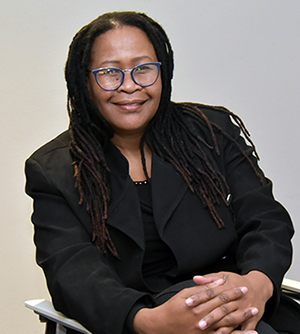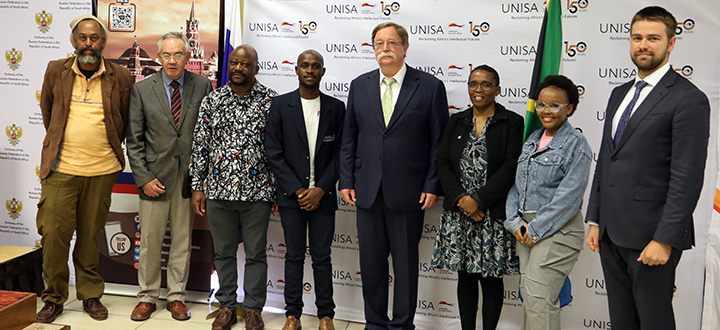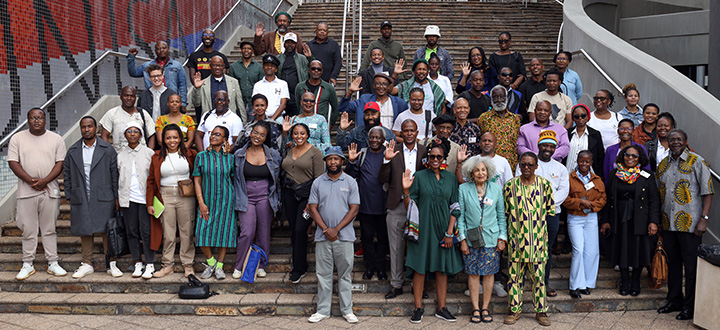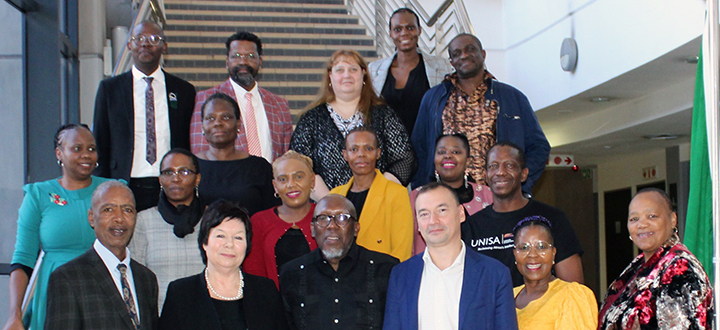News & Media
Pushing back the frontiers of poverty and improving lives

Prof Pumela Msweli (Acting ED: SBL) has developed a new project, the time banking volunteer programme for rural-urban global business skills transfer. This is particularly useful for mobilising resources to assist communities going through an economic crisis, such as that caused by the current Covid-19 pandemic.
The Unisa Time banking volunteer programme for rural-urban global business skills transfer is integrated with teaching and learning as it seeks to develop cognitive and metacognitive capabilities of students in impactful and tangible ways that are linked to community development. It further seeks to cultivate graduate attributes that are linked to deeper consciousness and awareness of connectedness of all people with diverse attributes including race, class, gender, age and social standing. The project was developed by Prof Pumela Msweli, the acting Executive Dean and CEO of the Graduate School of Business Leadership (SBL)
The aim of the project is to cultivate social activism among the SBL’s global business staff and students by utilising a time-banking system for rural communities to develop self-help projects that would eventually be part of an urban-rural value chain. It also aims to construct a teaching and learning assessment tool that incorporates journal reflections and social activism through the time-banking volunteer system to assess the deep learning and critical reflexivity of global business students.
Among others, Msweli saw the need to push back the frontiers of poverty and improve the lives of many South Africans languishing in poverty. As a global business scholar, she has observed that part of the problems faced by most communities is that their livelihoods have been displaced because of the presence of big businesses in the areas in which they live.
"Some members of these communities who were thriving entrepreneurs are no longer in business due to competition from big businesses. These entities have displaced the most marginalised and most vulnerable. The question that arises is how we innovate as institutions of higher learning to assist such communities to have a competitive edge. The answer to this question is multifaceted; one way is to come up with different intervention strategies to assist them," explained Msweli.
Describing the project, Msweli says the time-bank system is a way of exchanging skills and resources without spending money. She added that it is particularly useful for mobilising resources to assist communities going through an economic crisis, as is the case now with the impacts of Covid-19 on poor communities. Participants are volunteers who "deposit" their time by giving practical help, support and skills; and can "withdraw" their time when they need something done themselves.
"The impact of the pandemic and the lockdown measures have resulted in the loss of income in many villages and iilali (rural locations) in South Africa. This has created an economic crisis in these communities. The project will be piloted in Luthengele Village, a small community of 300 households in Port St Johns in the Eastern Cape. Women and children in that village have to travel for 10 km a day to fetch water from the Umzimvubu River, using 25-litre containers."
According to Msweli, South Africa’s education system has limited capabilities to inculcate the values of social activism. She says the outcome has been the dearth of civil society and social movement after the attainment of democracy in 1994, adding that the values of uBuntu have been eroded by materialism and consumerism.

Image source: Needpix
The project will focus on three economic sectors:
- Film production - targeting youth in the community
- Textile and clothing
- Agribusiness
The identified problems will be addressed by constructing a global business assessment tool that builds critical reasoning skills while simultaneously fostering social activism using the time-bank model. The project will create national and global value chains by transferring cooperative management skills and multimedia global marketing skills including film production skills, and by linking Luthengele self-help projects to markets in Gauteng.
Out of this, an alternative assessment tool will be developed, which will enable students to be assessed based on how well they use what they learn in class to assist communities deal with challenges presented by Global Business. While the groundwork has begun, the project will start in January 2021. For further information, an e-mail can be sent to etabanam@unisa.ac.za
* By Nancy Legodi, Acting Journalist, Department of Institutional Advancement
Publish date: 2020-10-14 00:00:00.0

 Unisa's student leadership engage with Russian ambassador
Unisa's student leadership engage with Russian ambassador
 Re-igniting and re-imagining Pan Africanism, Afrocentricity and Afrofuturism in the 21st century
Re-igniting and re-imagining Pan Africanism, Afrocentricity and Afrofuturism in the 21st century
 Unisa and Russian State University for the Humanities explore collaborative opportunities
Unisa and Russian State University for the Humanities explore collaborative opportunities
 Young Unisa science stars join elite Lindau Nobel Laureate group
Young Unisa science stars join elite Lindau Nobel Laureate group
 Education MEC addresses Unisa autism seminar
Education MEC addresses Unisa autism seminar